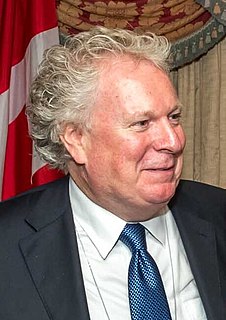A Quote by Jean Charest
The only difference between the easy goals and the tough goals is your determination.
Quote Topics
Related Quotes
If you're trying to be miserable, it's important you don't have any goals. No school goals, personal goals, family goals. Your only objective each day should be to inhale and exhale for sixteen hours before you go to bed again. Don't read anything informative, don't listen to anything useful, don't do anything productive. If you start achieving goals, you might start to feel a sense of excitement, then you might want to set another goal, and then your miserable mornings are through. To maintain your misery, the idea of crossing off your goals should never cross your mind.
Active questions are the alternative to passive questions. There is a huge difference between, 'Do you have clear goals?' and 'Did you do your best to set clear goals for yourself?' The former is trying to determine the employee's state of mind; the latter challenges the employee to describe or defend a course of action.
A winner is someone who sets their goals, commits themselves to those goals and then pursues their goals with all the ability that is given to them. That requires someone who beleives in themselves, who will make self sacrifices, work hard, and maintain the determination to perform at the best of their ability.
We need to set goals for ourselves. Start today...if you don't have any goals, make your first goal getting some goals. You probably won't start living happily ever after, but you may start living happily, purposefully, and with gratitude...Goals are gratitude in action. They give us the opportunity to build on what we already have. While achieving goals can be a lengthy process, we can learn to be grateful for each stage in the process of setting and meeting goals.
Keep yourself motivated. You've got to be motivated, you've got to wake up every day and understand what that day is about; you've got to have personal goals - short term goals, intermediate goals, and long term goals. Be flexible in getting to those goals, but if you do not have goals, you will not achieve them.
The only reason we really pursue goals is to cause ourselves to expand and grow. Achieving goals by themselves will never make us happy in the long term; it's who you become, as you overcome the obstacles necessary to achieve your goals, that can give you the deepest and most long-lasting sense of fulfillment.
You must ask, "What do we mean by great results?" Your goals don't have to be quantifiable, but they do have to be describable. Some leaders try to insist, "The only acceptable goals are measurable," but that's actually an undisciplined statement. Lots of goals-beauty, quality, life change, love-are worthy but not quantifiable. But you do have to be able to tell if you're making progress.



































